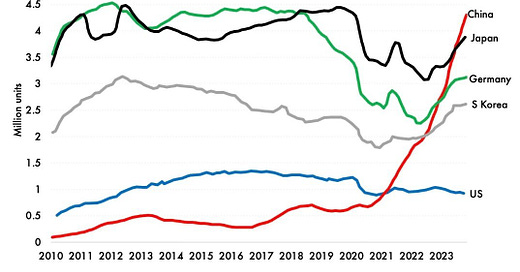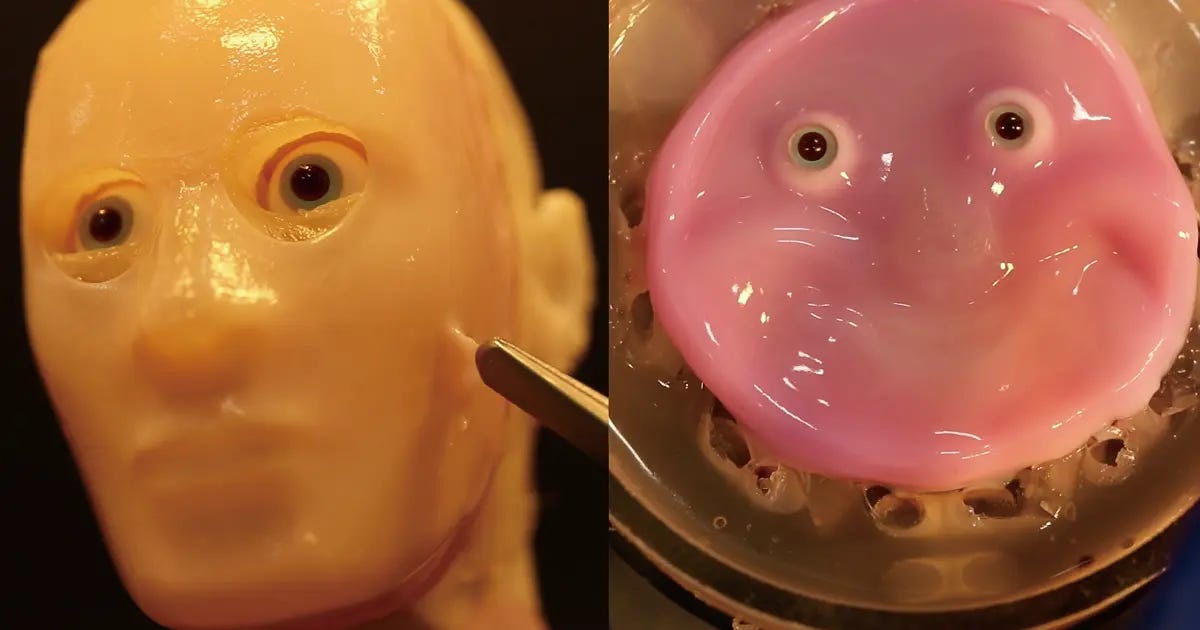🚀See what happens when 50 self-driving cars go crazy on a parking; AI spaghetti art & more
Hi,
This is Thomas, co-founder and CEO of digital agency KRDS, we have offices in Singapore, HK, Shanghai, Dubai and India. I’m also a co-founder of The WeChat Agency and Yelda.ai (more about me at the end).
You're receiving Future Weekly, my personal selection of news about some of the most exciting (and sometimes scary) developments in technology 🤖 summarized as bullet points to help you save time and anticipate the future 🔮.
Small Bites
Insane, see what happens when 50 self-driving cars go crazy on a parking: video
China has gone from being an also-ran exporter of cars to global leader in three years. (also-ran: 1. a contestant, horse, etc, failing to finish among the first three in a race. 2. an unsuccessful person; loser or nonentity.)
Pretty stunning AI spaghetti art... see the 20-sec video generated by AI
Nice AI-generated video of the prompt "fashion photoshoot inspired by Van Gogh”
Funny 40-sec video demo of a teleoperated humanoid robot stacking shelves with goods in a supermarket
Another impressive humanoid demo, say hello to Unitree G1, see the 1-min video here
“Humanoid agent AI avatar, Price from $16K” (from website, a Chinese company)
is it fake or real? not clear…
AI can (almost) generate a video game in real time as you play (source here et there)
It wasn’t known this was possible until now.
Normally, game developers would define the game rules, physics and assets upfront, in order to establish how everything in the game behaves.
However, in this case, a model created a playable game just by presenting each frame one after another sequentially. It paves the way for AI-assisted game design, where developers could prototype complex games through ordinary language.
“An AI-generated re-creation of the classic computer game Doom can be played normally despite having no computer code or graphics.”
It hints at a future of infinitely variable, emergent game worlds that adapt in real time to player actions.
See example with Mario and Doom
Crazy: man swallows pill containing wireless camera live on stage, streams inside of body for audience
Watch the TED talk set at the right time
During a fascinating TED talk, cofounder and engineer Alex Luebke showed off the company's latest invention, a tiny swallowable pill that gives physicians a live feed of the inside of the human body.
Luebke was confident enough in his startup's invention that he swallowed one of these pills live on stage, making for a unique demonstration of a potentially game-changing technology.
This pill was then remotely controlled — with a PlayStation 5 controller no less — by Mayo Clinic professor of medicine and Pillbot co-founder Vivek Kumbhari, giving audiences a fascinating live feed of the inside of Luebke's esophagus and stomach.
"So now that we're done here, PillBot will take its natural course through and out of the body," Kumbhari said. "And fortunately for Alex, he'll have no awareness of this, and he won't have to retrieve this capsule."
Dutch company ASML and Taiwanese company TSMC Can Disable Chip Machines If China Invades Taiwan. (Bloomberg)
Firms can remotely shut off advanced EUV (Extreme ultraviolet lithography) chip-making machines
The stakes are high, with around 90% of the world’s most advanced chips made in Taiwan.
What? Come on, Germany... (BBC)
82% of German companies still use fax machines on a regular basis. In many cases, fax is the go-to method for sharing medical information
Sam Altman Admits That OpenAI Doesn't Actually Understand How Its AI Works (source)
He said "We certainly have not solved interpretability,""
When pushed during the event by The Atlantic CEO Nicholas Thompson, who asked if that shouldn't be an "argument to not keep releasing new, more powerful models," Altman was seemingly baffled, countering with a half-hearted reassurance that the AIs are "generally considered safe and robust."
OpenAI Scale Ranks Progress Toward ‘Human-Level’ Problem Solving (Bloomberg)
Level 1 (where it think it's at): the kind of AI available today that can interact in conversational language with people
Level 2 (it says it's almost there): “Reasoners.” This refers to systems that can do basic problem-solving tasks as well as a human with a doctorate-level education who doesn’t have access to any tools.
Level 3: Agents,” referring to AI systems that can spend several days taking actions on a user’s behalf.
Level 4: AI that can come up with new innovations.
Level 5: AI that can do the work of an organization (same as AGI)
Former OpenAI governance researcher Daniel Kokotajlo Estimates 70%Chance That AI Will Destroy or Catastrophically Harm Humanity (!) (NYT)
According to one estimate of the 100-odd AI experts OpenAI has hired since 2016, about half have left. (The Economist)
The result is a market where ai talent, previously hoarded at tech giants, is becoming more distributed.
Roughly half of people who've tried ChatGPT never used it again (Ben Evans, in the WSJ)
At least 10% of research may already be co-authored by AI (The Economist)
The $700 Ai Pin, a talking lapel pin from the start-up Humane, which is funded by OpenAI’s chief executive, Sam Altman, was universally riduculed because it overheated and spat out nonsense (NYT)
SpaceX wants to build 1 Starship megarocket a day with new Starfactory (space.com)
SpaceX has added ~$100M and 21,000+ jobs to the economy in South Texas. (source)
Famous inventor Ray Kurzweil on how AI will transform the physical world (The Economist)
In all of history until November 2023, humans had discovered about 20,000 stable inorganic compounds for use across all technologies. Then, Google’s GNoME AI discovered far more, increasing that figure overnight to 421,000.
AI can rapidly sift through billions of chemistries in simulation, and is already driving innovations in both photovoltaics and batteries.
Well.... Japanese scientists have grown living skin in a lab and attached it to a robotic face, so that it can create rudimentary facial expressions. (source)
How WW2 literally transformed the way that we see our planet (historian Adam Tooze)
Air war in particular was vastly expensive, accounting for forty percent or more of the economic war effort of the Germans, Americans or British. By the end of the war, aerospace industries were the largest sectors of the industrial economy and remade entire regions with new factories and workforces.
Out of this gigantic effort was born the technology of modern logistics, radar and sonar, a new generation of aircraft with jet propulsion, and the Manhattan Project.
Meanwhile, Germany’s vain effort to find an answer to the West’s air power gave birth to ballistic weapons programs.
By the end of the war, cameras mounted on the tips of captured German V-2 rockets fired vertically upward rather than at London or Antwerp provided the first glimpses of the outer edge of the atmosphere and the curvature of the Earth. See the video on youtube !
The war thus literally transformed the way that we see our planet as is captured in this extraordinary newsreel from 1946.
South Korea to mass produce lasers that can take out drones at $1.50 a hit (CNN)
“It is invisible and noiseless, does not require separate ammunition and can be operated only when electricity is supplied,".
Future versions could be developed to take out much bigger targets, including aircraft and ballistic missiles, which would be a potential “game changer,” according to the release.
Elephants call each other by their names (The Guardian)
Researchers used AI to analyze the calls of two herds of African savanna elephants in Kenya. They found that elephants use specific vocalizations for each individual and recognize when they are being addressed by other elephants.
Finding this interesting? Share it on Whatsapp, just click here ❤️
If yes, feel free to take 3 seconds to forward that newsletter to one person, or share it on Whatsapp clicking here, I'd be immensely grateful.
If that email was forwarded to you, you can click here to subscribe and make sure to receive future editions in your mailbox (many CEOs and startup founders are subscribers)
Previous newsletters:
"The best computer interface I’ve ever used"; Musk Vs LeCun Twitter fight & more
Latest cool robot videos, Zuck's & Musk's last thoughts on AI
How a missing gene in our DNA affected the Battle of Trafalgar and gave birth to the Mafia
Superhuman: see how much work a professor did in 30 minutes with AI, + more gems about the future
That's it for this week :)
If you made it until here, well, thanks a lot for reading this newsletter! A very simple way to encourage me to continue doing this is to take a few seconds to:
transfer this to one curious friend, or share it on Whatsapp clicking here
click on the little star next to that email in your mailbox
click on the heart at the bottom of that email
Thank you so much in advance!
Here to subscribe to make sure you get the future editions if this one was forwarded to you.
More about me
I cofounded KRDS right after college back in 2008 in Paris, we now also have offices in Singapore, HK, Shanghai, Dubai and India, we're one of the largest independent digital agencies in Asia. More here.
Watch our latest game showreel: At KRDS, we take pride in designing and developing games from scratch for brands and organizations, big and small! Gamification has always been part of our DNA, since our early days creating viral apps on Facebook back in Paris as the very first Facebook marketing partner outside of the USA!
I also run The WeChat Agency for the Chinese market (the Government of Singapore Investment Corporation, GIC, is a client)
I’m the cofounder of Yelda.ai, which deploys voice AIs able to answer customers and prospects calling your company on the phone using natural language.
I also write op-eds and do podcasts at times. Here are my latest articles and podcasts, and here my last episode on the Abundance Makers podcast, interviewing one of the most promising clean tech CEOs in the US.
For the French speakers, I’ve written more than 50 articles on the future of technology over the past years, all can be found listed here.
Have a great weekend :)
Thomas





